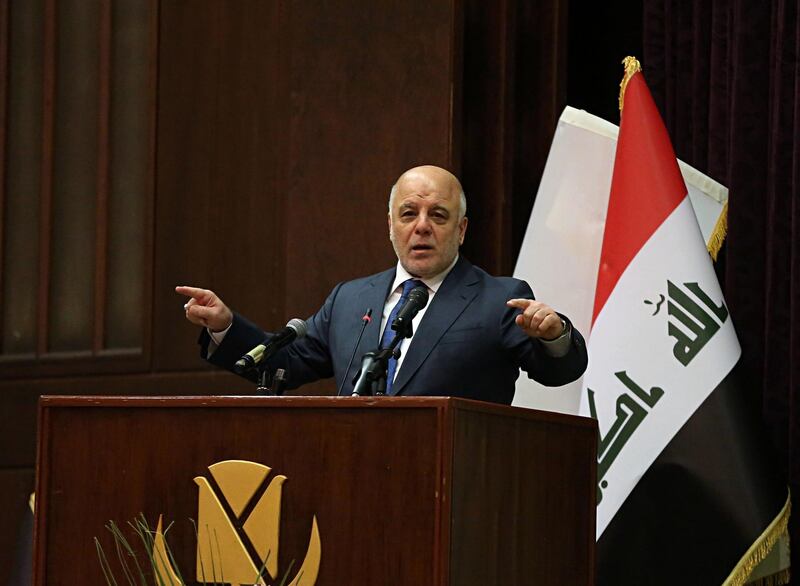Iraqi prime minister Haider Al Abadi has assured the nation that parliamentary and provincial elections will be held in Iraq in May as scheduled.
Mr Al Abadi has faced internal pressures from the State of Law Coalition and the Union of Sunni forces in addition to Kurdish parties to postpone the elections for at least six months, Al Hayat, the pan-Arab newspaper reported.
But in his weekly press conference, the prime minister dismissed any doubts, saying, “The cabinet today reiterated that provincial and parliamentary elections will be held on 12 May 2018.,” Mr Al Abadi said. “There is no reason for delaying the elections.”
The prime minister confirmed that the high electoral commission has confirmed that it is ready to organise both the local and national elections on the same day.
Iraq's Sunni political parties claim that displaced people should have the chance to return to their homes before the elections so they are given the chance to vote in the areas where they are registered.
Iraq's humanitarian crisis remain one of the largest and most volatile in the world as more than three million people are internally displaced as a result of Iraq's battle against ISIL.
_____________
Read more:
[ Iraqi Prime Minister sets election date for May 15 ]
Opinion: Iraq needs a long-term strategy as much as it needs short-term wins
[ Iraq president calls for direct talks between Baghdad and Erbil ]
_____________
"A key post-liberation objective for the government is to bring Iraqis together through meaningful and inclusive community-based reconciliation," Mr Al Abadi said. "We will restore peace and stability to all of Iraq and support the safe return of displaced people to their homes."
On December 9, Mr Al Abadi declared Iraqi fully liberated from ISIL, giving a huge victory for the state as ISIL extremists controlled nearly a third of the country.
"Post- victory re-construction is under way [in the country], we have chaired several meetings on this and I am monitoring progress very closely especially in the housing and energy sectors. We are determined to provide improved public services to all Iraqis," he said.
Meanwhile, Mr Al Abadi confirmed that Baghdad and Erbil, capital of Kurdistan, have agreed to hold talks and stated that his government has "no objection in resolving their differences."
____________
Read more:
[ Baghdad lists 13 preconditions for talks with Kurds ]
____________
Relations between the two sides deteriorated after Iraq’s Kurdish region voted for independence in a symbolic yet controversial referendum that was held in September despite Baghdad’s insistence that it violated the constitution.
The prime minister said that "we do not have a dispute with Kurdistan region or its people. Our outstanding issues with the region stems from transgressions by the Kurdish authorities and their failure to accept the illegality of the referendum."






